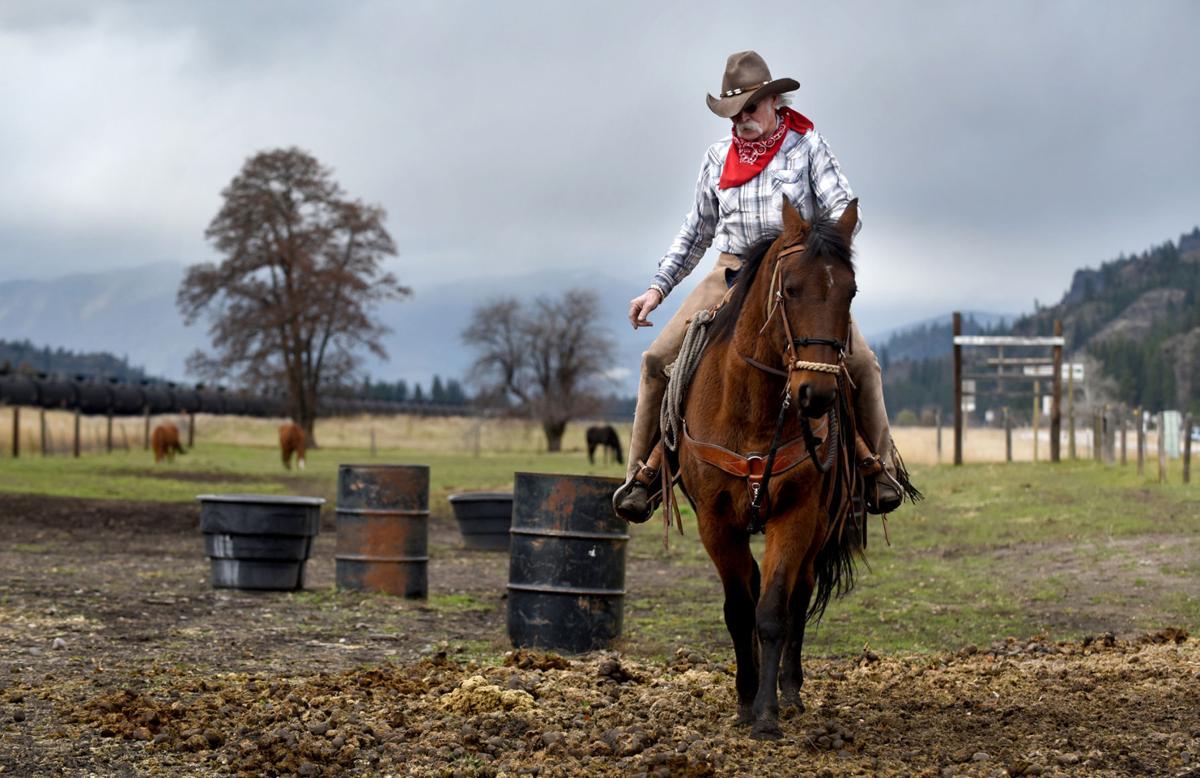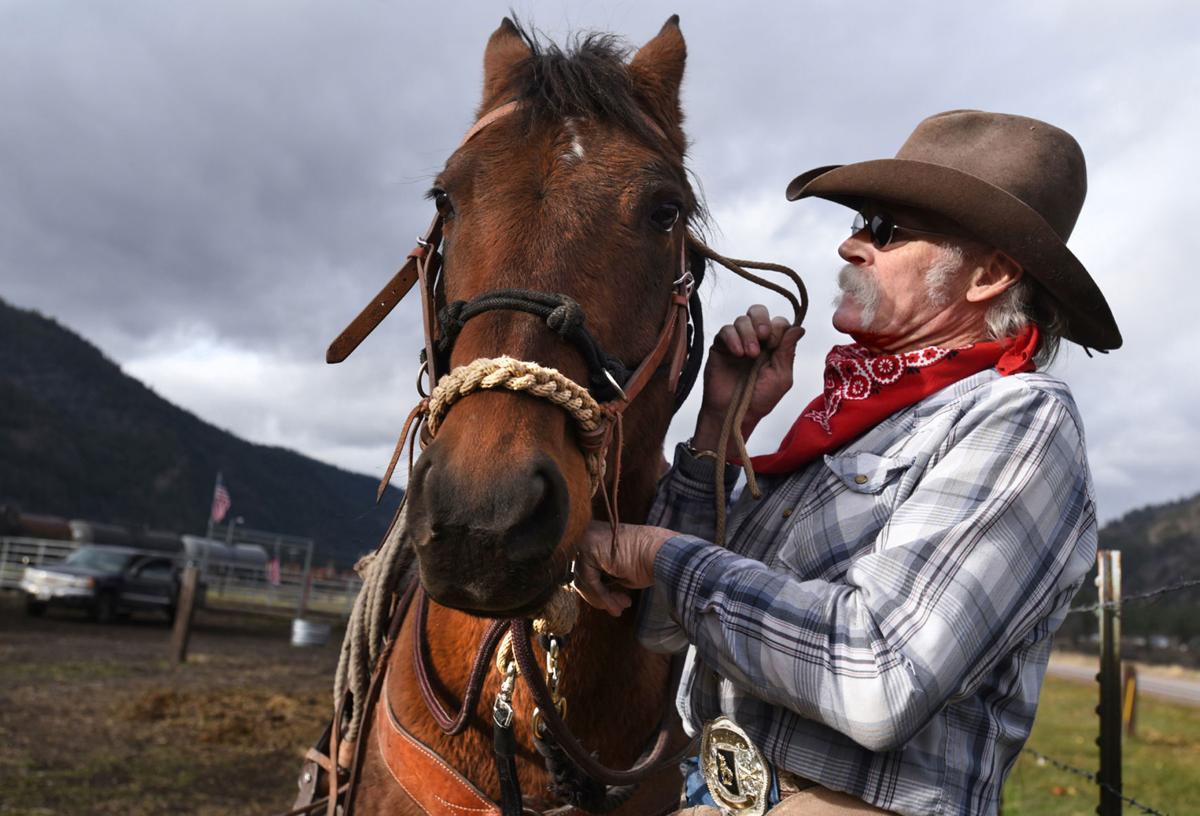Here's a Tough Ol' Bird after Turkey Day

In this Montana Standard report "Cowboy gives thanks for horses the only way he knows how" (article copied below), we learn about a fella that is living a horse-lover's life of thankfulness. John Thompson or "Jonie T" discribes his effort to live by "the cowboy tradition. That's respect, trust and honor. I'm praying our country gets back to those, but unfortuately those words are dying, just like the true cowboy is." So many of us horse prople (and Texans) strive to live up to life like that.
For Jonie however, living the cowboy's life has come via a winding, wrong side of the tracks way that left him with no easy deal. But that is not his point anymore. For him, it's about living to repay the horse victims of a abuse. He has since learned horses have the capacity to forgive men and heal from their own suffering as much as facilitate the healing of men. His way of helping horses heal is to"walk them though it, and replacing the pain with something that's loving and respectable."
In this story you can fell the grit and tenacity of life for both the man and the horses he works to save. It is a true Thankgiving tale full of Heart. Thank you Jonie!
http://mtstandard.com/news/state-and-regional/cowboy-gives-thanks-for-horses-the-only-way-he-knows/article_ee6ad14e-850d-5feb-b9d3-bd2e7c4a725f.html
ARTICLE FROM THE MONTANA STANDARD...
 Cowboy gives thanks for horses the only way he knows how: by breaking them
Cowboy gives thanks for horses the only way he knows how: by breaking them
VINCE DEVLIN for The Montana Standard
November 25, 2016
http://mtstandard.com/news/state-and-regional/cowboy-gives-thanks-for-horses-the-only-way-he-knows/article_ee6ad14e-850d-5feb-b9d3-bd2e7c4a725f.html
ARTICLE FROM THE MONTANA STANDARD...
 Cowboy gives thanks for horses the only way he knows how: by breaking them
Cowboy gives thanks for horses the only way he knows how: by breaking themVINCE DEVLIN for The Montana Standard
November 25, 2016
PARADISE – It’s just another day in Paradise for cowboy John Thompson, whose “ranch” is a corral squeezed between Montana Highway 200 and the railroad tracks that built this small town.
On this day, Thompson – you can call him “Jonie T.” – is locked in a battle of wits with Geronimo, a half-thoroughbred, half quarter horse that Jonie T. says was abused.
Geronimo has accepted a saddle, but has other ideas about letting Jonie T. sit in it, and dances in circles to get away from his 68-year-old trainer.
“Whoa! Whoa! Whoa!” Thompson repeats, turning ’round and ’round with Geronimo. The horse finally obeys, and Thompson carefully eases his boot into a stirrup, and himself onto the animal.
“A month ago he bucked me eight feet in the air,” Thompson says. “He’s come a long ways.”
So, too, has Jonie T., who is pretty sure horses saved his life.
He’s just trying to return the favor.
Locomotives to one side of the corral, and vehicle traffic on Highway 200 on the other, make this a nosier operation than you might expect, but it’s a patriotic one. In a circular pen built inside the corral, two American flags fly high over everything.
“My goal is to take all the fear out of a flight animal,” Thompson says. “What better place than somewhere that 17 trains a day go by on one side, and has a busy highway with logging trucks and semis with jake brakes on the other?”
Here at his corral flanked by trains and automobiles, Jonie T. will happily part with his philosophies, and his life story, to the willing listener.
“I’m an all-American cowboy,” he announces as he zips chaps over his jeans. “I live by the cowboy tradition. That’s respect, trust and honor. I’m praying our country gets back to those, but unfortunately those words are dying, just like the true cowboy is.”
Thompson says he won’t set foot on a machine with four wheels when a horse with four legs can do the job, and that no self-respecting cowboy would.
You might expect, then, that it would be the music of Hank Williams or George Jones that Thompson listens to, but out of the open doors on his GMC pickup, it’s “Fat Bottomed Girls” by the British rock band Queen that is playing on the radio.
“I listen to classic rock ’n’ roll,” Thompson says unapologetically.
So, too, do the other horses in the corral – Sundance Cree, Shadow Dancer and Pawnee Joe – who sidle up to the corral fence when Thompson arrives.
“Pawnee Joe, he’s my ‘Jughead,’” Thompson says. “He’s been my therapy. Him and Sundance Cree are the two horses that brought me back to reality.”
In his life, Jonie T. says he has worked on oil rigs, in a meat-packing plant, on a railroad section crew, as a ranch hand and on “on-call” jobs. He’s been married four times, divorced that many, and has seven children and 13 grandchildren to show for the unions.
“Forty-five years ago, this was a whiskey-drinking cowboy,” he says. “Quart and a half a day. Two guys out of the Libby AA (Alcoholics Anonymous) told me, ‘You keep doing what you’re doing you’re gonna die.’ ”
Born in Havre, Jonie T. says he was a “Hi-Line brat,” which he defines as “half-breeds (he’s part Chippewa-Cree) and full-bloods. I ran from Malta to Browning with a wild bunch.”
His time on the Hi-Line was interrupted by high school, when his family moved to Sanders County and Thompson enrolled at nearby Plains High School.
“I graduated in 1967, and I swore to God I’d never come back to this town,” Thompson says, a promise he kept for almost 40 years.
But things have a way of changing. When he did return to live with his mother, Loretta, he brought Sundance Cree and Pawnee Joe – and, he freely admits, mental health issues – with him.
But booze was no longer a part of his baggage.
“That (AA) program put a cork in the bottle and helped me walk away,” Thompson says. “It’s given me my life back. I told those two fellers in Libby, some day I’m going to do what you’ve done for me, but I’ll do it for horses.”
The day he returned to Sanders County 10 years ago, “I unloaded my horses down by the river, and knew I was home,” he says. “This is, truly, paradise.”
About five years ago his mental health counselor put Thompson in touch with the Montana Vocational Rehabilitation and Blind Services, a part of the Montana Department of Public Health and Human Services.
The agency helped Thompson pursue his dream – to one day operate a rescue ranch for horses that also offers equine therapy for children with autism and other disabilities – by getting his horse-training business up and running.
"I just want the ranch before I'm 90," he says. "I tell my grandkids, 'Don't ever stop believing.' It took me a whole lifetime."
He’s trained 60 horses in the last three to four years, Thompson says, using the philosophy that “you break the horse, not the spirit.”
It’s called “push and release,” Thompson says. “You push the horse to its limit, have them face their fears and let them run with it. Then you walk them through it, replacing the pain with something that’s loving and respectable. I had one guy tell me, ‘You’re not a horse whisperer. You’re a horse psychiatrist.’”
Things have gone well, he says, just not always on the financial side. Like most horse people, Jonie T. has a soft spot for abused or neglected horses, and he sometimes has to borrow money from his mother to feed ones he takes in.
A couple of years ago when he went to buy hay from his supplier in Trout Creek, he saw two sickly horses hanging around.
“They were the walking dead,” he says. “Nothing but bones with skin hanging off them. Couldn’t have weighed more than 265 pounds.”
When he asked his hay supplier whose horses they were, the man said, “Hopefully, yours. Somebody dropped them off in the middle of the night.”
“What are you going to do if I don’t take them?” Thompson says he asked.
They’ll be destroyed, Thompson says he was told.
So Shadow Dancer and Cheyenne Autumn came home to Paradise with Jonie T, joining Sundance Cree, Pawnee Joe and whatever client horses have been around. He says he’s spent more than $8,000 caring for the rescue animals, and recently “sold” Cheyenne Autumn to a friend.
“I say ‘sold,’ but I haven’t gotten any money for him yet,” Thompson says. “That’s OK, because I know he has a good home. I’m not into it to get rich. If I can help a horse, especially an abused horse, I’ll do it. I get rich in the rewards I can see in the horses.”
Thompson says a Lakota Sioux Indian in North Dakota taught him the “mustang way” of breaking a horse and “one day I’ll run into a mustang I can use it on.”
It begins, he says, with getting a horse in a pen, tying a rope around its neck, and letting the animal run until it’s had enough.
“Just let him run till he’s done, and focuses on me,” Jonie T. says. “Then I’ll walk with them, say ‘Whoa’ and we’ll stop. Take a step back, stop. Go forward, stop.”
It’s a long process, and every horse is different.
Thompson had 40 hours of work into one animal, “and I still couldn’t get him to face whatever was bothering him,” he says. “I told my mom one morning, ‘Today is the day I finish that horse.’”
He got on the horse in the smaller pen, then rode him into the larger corral to take him around barrels located there.
“I got him around one time, but the second time he took off,” Thompson says. “I dropped the reins and raked him with my spurs, and we just went flying west. The fence was getting closer and closer and I knew I had to get him to turn or we’d both go through the barbed wire.”
But when the horse turned, “It was at a 90-degree angle,” Thompson goes on. “I lost my balance, grabbed the saddle horn, and it snapped. When my weight shifted the horse knew he had his chance, and he bucked me into the barbed wire fence, then (kicked) me with all 900 pounds.”
Someone who had pulled up near the highway to watch the scene called out to ask Thompson if he was OK.
“I said, ‘Yeah, I just got a horse to finish,’” Thompson says. “I grabbed the lead rope, got him back in the round pen, put my spurs in his backside and he ran and ran till he couldn’t run no more. When he finally tired out and put his neck down I come up to him and said, ‘You done?’”
And only then, Thompson says, did he notice that his boots were blood red and he was “bleeding like a cut turkey.” He drove himself to Clark Fork Valley Hospital in Plains, where he was stabilized and transported to St. Patrick Hospital in Missoula.
But he was back at work as soon as possible, because this is where he loves to be.
“I wish I had patience with people like I do horses,” Thompson says.
If you’re looking for a Thanksgiving angle to this story, there isn’t one, at least not beyond the fact that Jonie T. is ever so thankful he gets to spend his days with horses.
But you know, for a cowboy, that’s enough.

Comments
Post a Comment